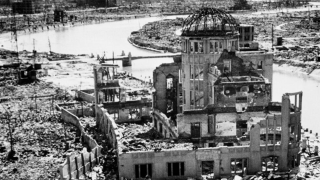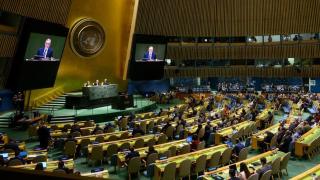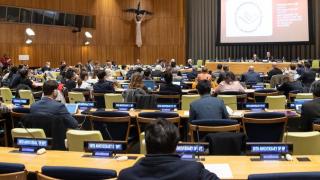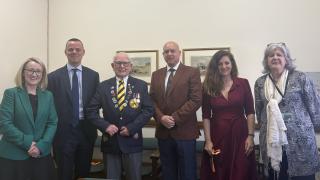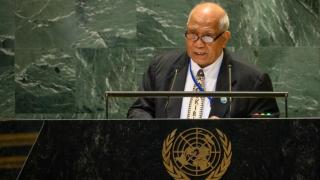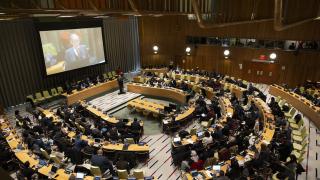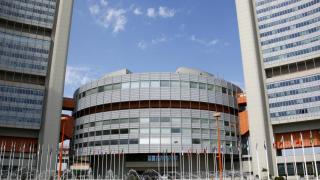
UNA-UK has joined academics, faith groups, scientists and civil society organisations to urge Liz Truss, Secretary of State for Foreign, Commonwealth and Development Affairs, to send UK diplomats to observe the First Meeting of States Parties of the UN Treaty on the Prohibition of Nuclear Weapons (TPNW), taking place in Vienna from 21-23 June 2022. The letter also calls on the UK to attend the associated Vienna Conference on the Humanitarian Impact of Nuclear Weapons, hosted by the Austrian Government on 20 June.
The UK maintains that it will not attend the meeting; however, the letter urges the UK to reconsider and points out significant opportunities for the UK to pursue its commitment to an open, values-based “Global Britain” as outlined in the UK’s 2021 Integrated Review. There is still time for the UK to change its mind and engage constructively with the majority of the world’s governments, who will be present for the talks in Vienna. Unlike ratification of the Treaty, attending as an observer would not require a state to give up its nuclear weapons.
The UK’s attendance would be welcome on principle, but also for practical reasons. The United Kingdom has carried out 45 nuclear weapons test explosions, and “the health impacts suffered by veterans and indigenous populations remain woefully under-assessed and largely dismissed by successive UK Governments - through this framework, the UK has an opportunity to address this”, the letter indicates.
Ben Donaldson, UNA-UK Head of Campaigns, said, “the UK has tested nuclear weapons in Australia, Kiribati, and America and in all cases has failed to appropriately recognise the harm done to local communities and veterans. UNA-UK works for nuclear disarmament not just because of the catastrophic global threat their continued existence represents for humanity, but because of the tangible harms that the nuclear weapons testing and manufacture continues to cause”.
Thirty-four organisations and civil society leaders signed the letter, and you can read it here.
UK Government, let’s talk about Kiribati
On the other side of the world in the middle of the Pacific Ocean, Kiribati was rounded on as the UK’s nuclear weapons second test ground after public backlash made continued testing in Australia difficult. The UK went on to explode nine thermonuclear weapons in Kiribati in the 50s, and facilitate a further 24 US test detonations in the 60s.
In Kiribati (a state party to the TPNW), the Kiritimati Association of Cancer Patients Affected by the British and American Bomb tests has reported numerous health problems that they attribute to the testing. As of 2018, this Association identified at least 48 survivors in Kiribati who had experienced the tests first-hand and 800 descendants. Many have health problems consistent with exposure to radiation, including blindness, hearing problems, cancers, heart disease, and reproductive difficulties. They report that their children and grandchildren have suffered similar illnesses and other intergenerational effects.
“The case of Kiribati is particularly relevant to the UK given its status as a colony at the time of the UK’s tests and the lack of assessments of possible health damage to the local population. Through the Treaty on the Prohibition of Nuclear Weapons the UK now has an opportunity to do something about this legacy of harm”, Donaldson added: “we sincerely hope the UK will not let its ideological opposition to the TPNW stand in the way of working constructively to assist this important programme of victim assistance and environmental remediation”.
Philomena Lawrence, a Kiritimati (part of the Republic of Kiribati) islander now based in the UK, added her voice to the call in a powerful personal letter sent to the Prime Minister, Boris Johnson, “it’s almost 65 years since the bomb tests were done on Kiritimati, and still the British Government and American Government say there is no damage done to the lives of the people of Kiritimati or the island as a whole.”
She writes:
“Even though I was not on the Island during the bomb tests my eldest sister was and her child was born there. It was a very scary time for them. During the tests they were either taken on board the ship and put in the manhole of the ship or they were all put on a tennis court covered with tarpaulin. She had her baby son with her during one of the tests, and when the bomb exploded the light was so bright she could see all the bones in her baby’s body as she held him. When she looked at the people sitting next to her they all looked like skeletons. My sister didn’t live long - she died in her mid-forties. Her husband died in his fifties and my nephew died in his forties. We wonder why my sister and her family died so young.”
“We plead that the British Government as a leading Commonwealth nation should lead the way to ban nuclear weapons. And we plead that the British Government comes and joins the Meeting on the Prohibition of Nuclear Weapons in Vienna this month where there will be discussions between countries about how to help victims and clean up environments affected by nuclear weapons”, Lawrence concludes.
Read her letter here.
UNA-UK sees the TPNW as complementary to the Treaty on the Non-Proliferation of Nuclear Weapons (NPT) and expects a programme of work will be adopted that links these two treaties together in a constructive way. There is also strong hope for a political declaration and action plan to be adopted, which will establish work on victim assistance and environmental remediation – we sincerely hope the UK will support these efforts.
UNA-UK is a proud partner of the International Campaign to Abolish Nuclear Weapons (ICAN). Follow @nuclearban and @benaldson on Twitter for updates from the Vienna conference later this month.
Photo: A centre view of United Nations Vienna International Centre. 28/Aug/2009. Vienna, Austria. The UK has a permanent team of diplomats based at UNOV just a few minutes’ walk away from where more than 100 countries are expected to meet for 1MSP. Credit: Mark Garten/ UN Photo.

